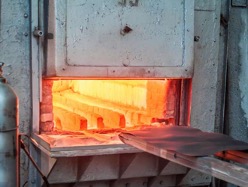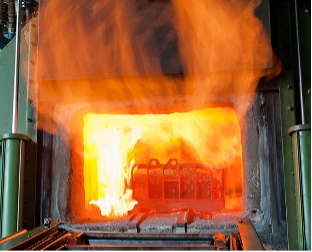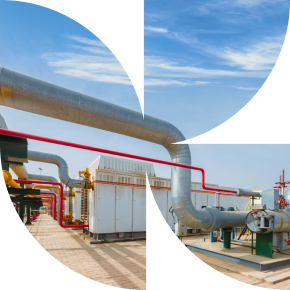Our Processes


Heat Treatment
Heat treatment is a crucial process in manufacturing that involves the controlled heating and cooling of metals and alloys to enhance their properties.
we specialize in providing high-quality heat treatment services designed to enhance the performance and durability of critical components in industries such as cement and steel manufacturing. Our advanced techniques ensure that your equipment withstands the toughest conditions, reduces downtime, and increases operational efficiency.
Our Heat Treatment Services
We offer a comprehensive range of heat treatment services to help industries like cement and steel manufacturing increase operational efficiency. Each process follows industry standards, ensuring that every component is heat-treated to achieve maximum performance and longevity.
Our services include:
Annealing
Carburizing
Quenching & Tempering
Hardening
Stress Relieving

Heat treatment processes
Each process is carried out in strict accordance with industry standards, ensuring that every component is heat-treated to achieve maximum performance and longevity.
Heat treatment furnaces are essential for various processes that alter the properties of metals and alloys, improving their strength, hardness, ductility, and resistance to wear. Different types of furnaces are used depending on the specific heat treatment process and the material being treated.
Type of Furnace | Process | Temperature Range | Key Benefits |
Muffle Furnace | Annealing, Hardening | 300°C to 1,200°C | Precise temperature control, clean atmosphere |
Salt Bath Furnace | Hardening, Quenching | 150°C to 800°C | Uniform heating, rapid quenching, minimal distortion |
Carburizing Furnace | Carburizing, Hardening | 900°C to 1,000°C | Increases surface hardness |
Box Furnace | Annealing, Aging, Stress-Relieving | 500°C to 1,100°C | Uniform heating, batch processing |
Induction Furnace | Hardening, Melting | Varies, up to 1,500°C | Fast, localized heating, energy efficient |
Vacuum Furnace | Annealing, Brazing, Hardening | 300°C to 1,200°C | Oxidation-free, ideal for high-purity metals |
Pit Furnace | Annealing, Tempering | 600°C to 1,000°C | Large parts, minimal oxidation |
Rotary Furnace | Sintering, Calcining | 300°C to 1,200°C | Uniform heating for bulk materials |

Performing chemical analysis tests and using a hardness tester
are essential steps to ensure the quality and effectiveness of the treatment. These tests help verify that the material has undergone the correct thermal processes and has the desired properties for its intended application.
Chemical analysis is crucial to ensure the material composition is correct and that the heat treatment process has not altered the material in undesired ways. These tests can determine the alloy’s composition, detect contaminants, or check for changes in chemical properties after heat treatment.
Hardness testing is one of the most essential steps in assessing the effectiveness of heat treatment. The right hardness ensures that the material has the necessary strength, wear resistance, and durability for its intended use.
Chemical analysis is crucial to ensure the material composition is correct and that the heat treatment process has not altered the material in undesired ways. These tests can determine the alloy’s composition, detect contaminants, or check for changes in chemical properties after heat treatment.
Hardness testing is one of the most essential steps in assessing the effectiveness of heat treatment. The right hardness ensures that the material has the necessary strength, wear resistance, and durability for its intended use.
Both chemical analysis and hardness testing are crucial for different stages of the heat treatment process:
- Before heat treatment: Chemical analysis ensures the correct alloy composition for the intended application.
- After heat treatment: Hardness testing is used to ensure that the desired mechanical properties (e.g., hardness, strength) are achieved.
We are always ready to help you and answer your questions

